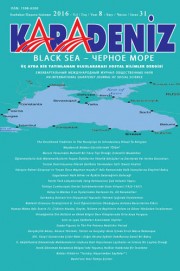Hamza-Nâme Adlı Eserin 72. Cildinin Atasöz, Deyim, İkileme ve Beyitlerin Anlam ve Görev Yönünden İncelenmesi
The Analsysis Of The Work Named Hamza-Name From The Point Of Sayings, Idioms, Reduplication And Verses
Author(s): Osman TürkSubject(s): Islam studies, Semantics, Turkish Literature, Turkic languages
Published by: Kültür Ajans Tanıtım ve Organizasyon
Keywords: Hamza-name; saying; idiom; reduplication;
Summary/Abstract: In the research carried out about Hamze-name, the sayings, idioms, reduplications and couplets have been examined in there functioning structures and types. Hamze-name has been studied in the intentions of literature, underlining general features and the language used by the author. Hamze-name has been converted into written text by Ahmedi’s brother Hamzavi. Within the examined study that has been done about the Hamza-name art work, it is of ease to understand and mention that; before Hamze-name was interpreted into written text, it was an oral tradition spoken by Turks and it had an important dignity within the Islamic world. With the context of rich epical literature, Hamze-name has contributed to the Islamic to the Islamic world but besides this, it has extended historical and cultural alikeness to the new comers of the Muslim nation which were Iran and Arabia. In the study, Hamza-name’s sayings, idioms, reduplications and couplets have been examined. The words and word groups that consist within the art work have been studied by their periodical tone. The wordings have been studied by Hamza-name’s functional structure. Sayings and idioms have been studied in their actual meanings, then have been examined within the text to be able to compare and contrast. Reduplications have been split into groups, thus these groups have been studied by their meanings and their operating functions that takes place in the text. Prosody groupings of the couplets have been determined and converted into modern Turkish. In the research a copy of the art work, the sayings, idioms, reduplications and couplets have been provided with explanations of their types, meanings and functions.
Journal: Karadeniz Uluslararası Bilimsel Dergi
- Issue Year: 2016
- Issue No: 31
- Page Range: 183-192
- Page Count: 10
- Language: Turkish

